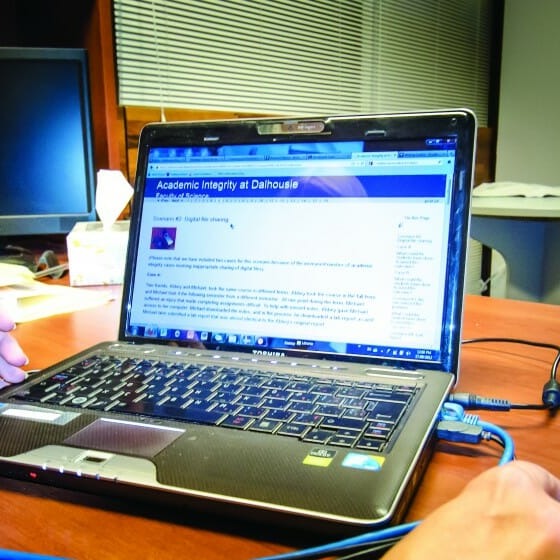
Cheating is getting more frequent at Dalhousie—but that’s not why the faculty of science is making a newly developed Blackboard module on plagiarism mandatory for first- and second-year students.
Swapan Dasgupta estimates that in his three years as the associate dean (administration) and academic integrity officer at Dal, the number of students who’ve cheated has doubled from about 40 per year to 80.
The newly created module will help faculty address some of the common mistakes students are making. When it comes to plagiarism, the goal is to prevent the avoidable cases.
“There are obvious issues, but how to deal with them isn’t always so obvious,” says Dasgupta. “Paraphrasing, improper collaboration, file sharing, improper citations, and how to even prevent being copied off of.”
The Writing Centre, located in the Killam library designed the module over almost two years. It’s currently geared specifically to the faculty of science, but open to be used by anyone. It was completed in January, and was made available to faculty and related societies to see what the module covered.
The faculty of science made the module mandatory for first and second year students this semester, with a deadline of Oct. 8.
Johanna Goosen, the external director of Dalhousie Student Advocacy Service was one of the first to test the trial version.
“Right now it’s multiple choice,” says Goosen. “Yes/no, pass/fail, that sort of thing and I think that, while that’s great, it doesn’t really force students to engage with the process as much as much as it could.”
“It’s quite simple and straightforward, but on the same token they’re mostly simple and straightforward issues. The purpose of it, it seems to me, is just so that people have academic integrity issues in the forefront of their mind when they’re going into their programs.”
What the faculty and administration want to make clear is this: the module is a tool to help students before they find themselves in a compromising position.
“It was felt that a more proactive approach would benefit students and faculty alike,” says Dasgupta.
“Actual academic integrity cases in science, with details changed to protect privacy, were used by the Writing Centre to effectively illustrate the kind of problems which can easily crop up in science classes and which perhaps could, equally easily, have been prevented by taking proper precautions.”
It is not uncommon for students to receive a failing grade or expulsion over something as innocent as an improper citation, or for letting their roommate read over their assignment and having it unknowingly copied.
But the module cannot prevent students from willfully plagiarizing. For the students who do cheat, completing the module will have no effect on the severity of their punishment.
The project will be reviewed in a year’s time. Whether or not it will continue to be mandatory, whether other departments pick up on the idea, or whether or not it affects how punishments are doled out to students will be decided then.
“I think that it’s a great start. You’ve gotta build from somewhere,” says Goosen.







